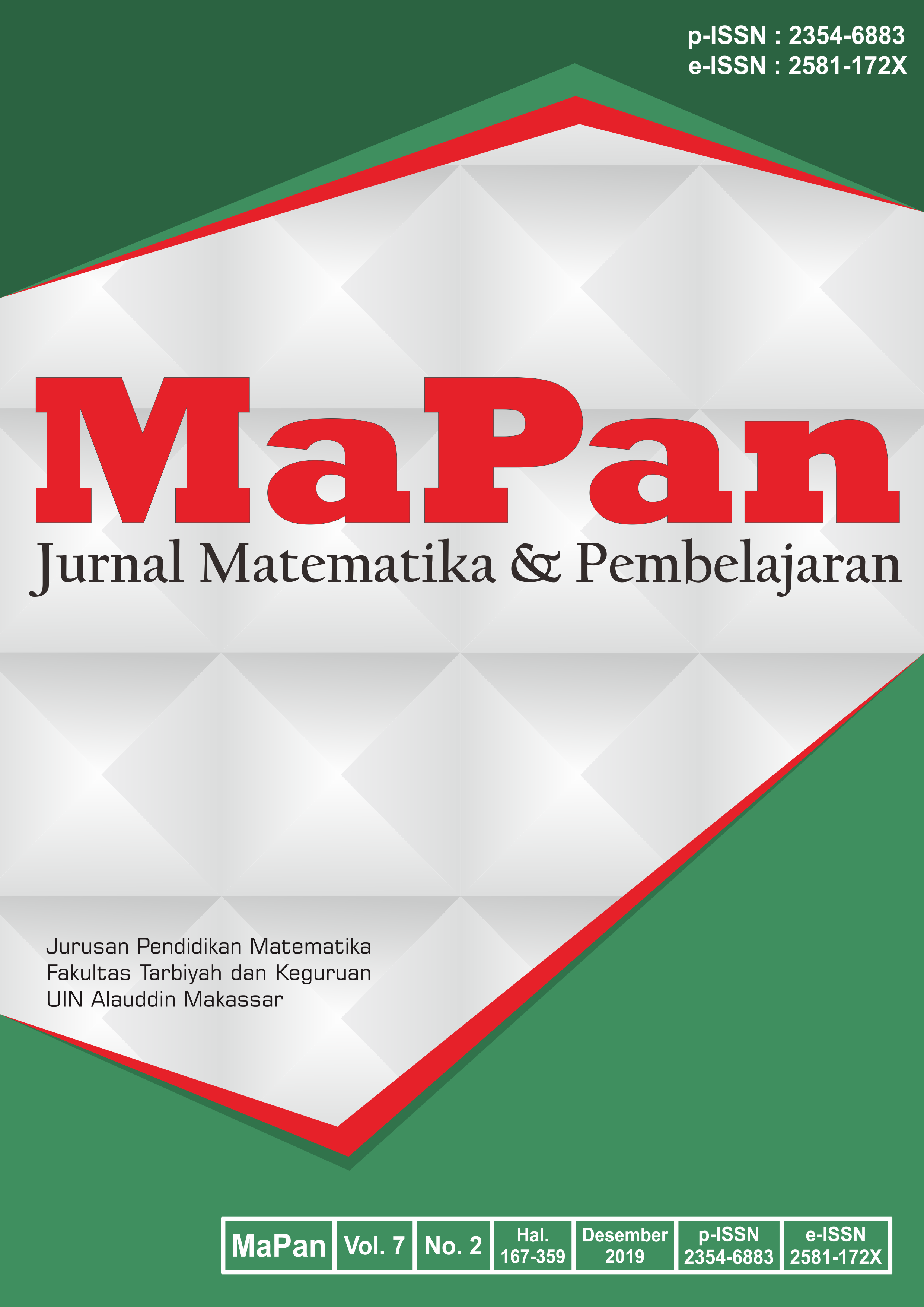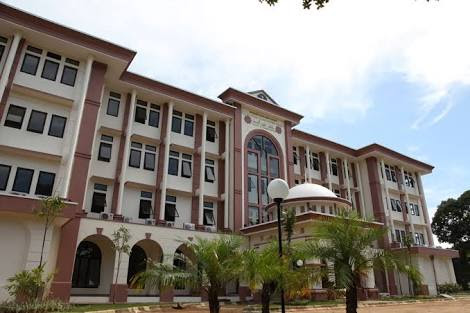MENGOPTIMALKAN DUKUNGAN GURU DALAM MELIBATKAN SISWA MENGGUNAKAN ARGUMENTASI KOLEKTIF PADA PEMBELAJARAN MATEMATIKA
Abstract
Abstrak:
Penelitian ini bertujuan untuk mendeskripsikan dukungan guru pada argumentasi kolektif berupa aktivitas guru yang dapat mendorong keterlibatan siswa dalam pembelajaran matematika. Pembelajaran matematika dengan argumentasi kolektif memungkinkan siswa dapat mengungkapkan ide, berbagi ide dalam diskusi kelas, dan membuktikan ide tersebut sehingga dapat diterima dan disepakati bersama oleh seluruh siswa di kelas. Dukungan guru pada argumentasi kolektif dapat memfasilitasi diskusi matematika, mendorong aktivitas siswa, dan keterlibatan siswa dalam pembelajaran matematika. Penelitian ini merupakan penelitian deskriptif dengan pendekatan kualitatif yang melibatkan seorang guru matematika dan 30 siswa kelas 11 pada materi program linear. Data dikumpulkan melalui lembar observasi aktivitas guru dan siswa, dan angket keterlibatan siswa yang diadaptasi dari Reeve dan Tseng. Analisis data dilakukan secara kualitatif melalui verifikasi data, penyajian data, dan penarikan kesimpulan. Hasil penelitian ini menunjukkan bahwa guru tidak memberikan tugas tertulis sehingga siswa tidak dapat memperoleh data untuk membangun argumennya dan rata-rata frekuensi keterlibatan siswa pada aspek keterlibatan agen sebesar 14,2%, aspek keterlibatan perilaku sebesar 26%, aspek keterlibatan emosi sebesar 27,5%, dan aspek keterlibatan kognitif sebesar 24,9%.
Abstract:
This study aimed to describe teacher’s support on collective argumentation in the form of teacher’s activities that could encourage the student engagement in learning mathematics. This study used qualitative method with descriptive approach which involved a mathematics teacher and 30 eleventh grade students in learning linear program material. The data were collected through observation sheet of teacher’s and students’ activities, and the questionnaire of engaging students which adapted from Reeve and Tseng. The data were analyzed qualitatively through data verification, data presentation, and make a conclusion. The result of this study showed that the teacher did not give written assignment so that the students could not gain data to build their arguments. The average frequency of student engagement on the aspects of agentic engagement was 14.2%, behavioral engagement was 26%, emotional engagement was 27.5%, and cognitive engagement was 24.9%.
Downloads
References
Aguiar, O. G., Mortimer, E. F., & Scott, P. (2010). Learning from and responding to students’ questions: The authoritative and dialogic tension. Journal of Research in Science Teaching, 47(2), 174–193. Retrieved from https://onlinelibrary.wiley.com/doi/pdf/10.1002/tea.20315
Alibali, M. W., Nathan, M. J., Boncoddo, R., & Pier, E. (2019). Managing common ground in the classroom: Teachers use gestures to support students’ contributions to classroom discourse. ZDM: The International Journal on Mathematics Education, 51(2), 347–360. Retrieved from https://www.researchgate.net/publication/332022421_Managing_common_ground_in_the_classroom_teachers_use_gestures_to_support_students%27_contributions_to_classroom_discourse
Brown, R. (2005). Exploring spaces of collaborative learning within a collective argumentation classroom. In Mathematics Education and Society Proceedings of the 4th International Mathematics Education and Society Conference (pp. 104–114).
Brown, R. (2017). Using collective argumentation to engage students in a primary mathematics classroom. Mathematics Education Research Journal, 29(2), 183–199. Retrieved from https://link.springer.com/article/10.1007/s13394-017-0198-2
Brown, R., & Redmond, T. (2007). Collective argumentation and modelling mathematics practices outside the classroom. In Proceedings of the 30th annual conference of the Mathematics Education Research Group of Australasia (Vol. 1, pp. 163–171). Retrieved from https://core.ac.uk/download/pdf/143875561.pdf
Brown, R., & Reeves, B. (2009). Students’ recollections of participating in collective argumentation when doing mathematics. In Crossing Divides: Proceedings of the 32nd annual conference of the Mathematics Education Research Group of Australasia (pp. 73–80). Retrieved from http://citeseerx.ist.psu.edu/viewdoc/download?doi=10.1.1.587.8303&rep=rep1&type=pdf
Chairani, Z. (2015). Scaffolding dalam pembelajaran matematika. Math Didactic: Jurnal Pendidikan Matematika, 1(1), 39–44. Retrieved from https://www.neliti.com/publications/176909/scaffolding-dalam-pembelajaran-matematika#cite
Conner, A., Singletary, L. M., Smith, R. C., Wagner, P. A., & Francisco, R. T. (2014). Teacher support for collective argumentation: A framework for examining how teachers support students’ engagement in mathematical activities. Educational Studies in Mathematics, 86(3), 401–429. Retrieved from https://link.springer.com/article/10.1007/s10649-014-9532-8
Francisco, J. M. (2013). Learning in collaborative settings: Students building on each other’s ideas to promote their mathematical understanding. Educational Studies in Mathematics, 82(3), 417–438. Retrieved from https://link.springer.com/article/10.1007/s10649-012-9437-3
Friesen, R. A., & Schütte, M. (2018). Pupils’ participation in collective argumentation within multi-age mathematics education at primary level. In Proceedings of The IV ERME Topic Conference ‘Classroom-Based Research on Mathematics and Language’ (pp. 65–72). Retrieved from https://hal.archives-ouvertes.fr/hal-01856478/document
Hunter, R. (2007). Can you convince me: Learning to use mathematical argumentation. In Proceedings of the 31st Conference of the International Group for the Psychology of Mathematics Education (Vol. 3, pp. 81–88). Retrieved from ftp://ftp.math.ethz.ch/EMIS/proceedings/PME31/3/81.pdf
Kusaeri, K., Aditomo, A., Ridho, A., & Fuad, A. (2018). Socioeconomic status, parental involvement in learning and student’ mathematics achievement in Indonesian senior high school. Cakrawala Pendidikan Jurnal Ilmiah Pendidikan, 37(3), 333–344. Retrieved from https://journal.uny.ac.id/index.php/cp/article/view/21100
Reeve, J., & Tseng, C. M. (2011). Agency as a fourth aspect of students’ engagement during learning activities. Contemporary Educational Psychology, 36(4), 257–267. Retrieved from https://www.sciencedirect.com/science/article/abs/pii/S0361476X11000191
Sardiman, A. M. (2006). Interaksi & motivasi belajar mengajar. Jakarta: PT Raja Grafindo Persada.
Staples, M. (2007). Supporting whole-class collaborative inquiry in a secondary mathematics classroom. Cognition and Instruction, 25(2–3), 161–217. Retrieved from https://www.tandfonline.com/doi/abs/10.1080/07370000701301125
Stein, M. K., Engle, R. A., Smith, M. S., & Hughes, E. K. (2008). Orchestrating productive mathematical discussions: Five practices for helping teachers move beyond show and tell. Mathematical Thinking and Learning, 10(4), 313–340. Retrieved from http://www.math.chalmers.se/Math/Grundutb/GU/L930MA/H13/Mathematical Thinking and Learning.pdf
Sudjana, N. (2010). Dasar-dasar proses belajar. Bandung: Sinar Baru.
Suhendra, M. (2010). Argumentasi matematik sebagai sebuah kompetensi matematik. Jurnal Pengajaran MIPA, 15(1), 1–3. Retrieved from http://journal.fpmipa.upi.edu/index.php/jpmipa/article/download/284/195
Uygun, T., & Akyüz, D. (2019). Preservice middle school mathematics teachers’ understanding of triangle inequality through collective argumentation. İnönü Üniversitesi Eğitim Fakültesi Dergisi, 20(1), 27–41. Retrieved from http://www.idealonline.com.tr/IdealOnline/lookAtPublications/paperDetail.xhtml?uId=95239&
Wagner, P. A., Smith, R. C., Conner, A., Francisco, R. T., & Singletary, L. (2013). Using toulmin’s model to develop prospective teachers’ conceptions of collective argumentation. In Proceedings of the 35th annual meeting of the North American Chapter of the International Group for the Psychology of Mathematics Education. Retrieved from https://www.semanticscholar.org/paper/Using-Toulmin’s-Model-to-Develop-Prospective-of-Wagner-Smith/a785f4c3e4eaa6c6212bbad222435096267602c3
Webb, N. M., Franke, M. L., Ing, M., Wong, J., Fernandez, C. H., Shin, N., & Turrou, A. C. (2014). Engaging with others’ mathematical ideas: Interrelationships among student participation, teachers’ instructional practices, and learning. International Journal of Educational Research, 63, 79–93. Retrieved from https://www.sciencedirect.com/science/article/pii/S0883035513000141
Yackel, E. (2002). What we can learn from analyzing the teacher’s role in collective argumentation. Journal of Mathematical Behavior, 21(4), 423–440. Retrieved from https://www.sciencedirect.com/science/article/abs/pii/S0732312302001438
Yopp, D. A. (2012). Valuing informal arguments and empirical investigations during collective argumentation. PRIMUS: Problems, Resources, and Issues in Mathematics Undergraduate Studies, 22(8), 643–663. Retrieved from https://www.tandfonline.com/doi/abs/10.1080/10511970.2011.621164


